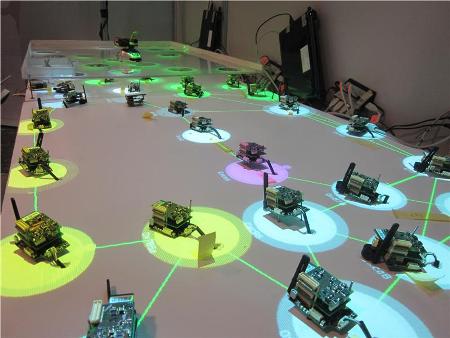A research team from the Universitat Politècnica de Catalunya (UPC), the ALBCOM research group (Algorithms, Bioinformatics, Complexity and Formal Methods) is to create a shared testing laboratory, the European Wisebed Laboratory.
The team till date has created more than a thousand sensors and has created algorithms needed to make the network an integrated and effective platform to be used for complicated calculations.
 Wisebed: Simulation of a sensor network, where each colour is a cluster (group of sensors).
Wisebed: Simulation of a sensor network, where each colour is a cluster (group of sensors).
Sensors are very useful tools capable of facilitating scientific progress by gathering and monitoring environmental data such as sound, pollution, movement, vibrations, temperature, light and humidity. They can execute complicated computational calculations by making use of local radio frequency communications among sensors and this is the basis of the Wisebed European research project. This project has been sponsored and funded by the European Union’s Seventh Framework Program. This program initiated in 2008 has been the force behind the creation of a sensor network, which would act as a testbed or laboratory for scientists to test and evaluate their algorithms’ computational power.
Even though the team headed by Josep Diaz has helped to create the hardware for the project, their main purpose was to develop algorithms to organize the network hierarchy in a manner as to accelerate communication, time synchronize the sensors and self-regulate the energy used by the sensors for maintenance of required connectivity and to maximize their lifetime. This technology could be used to make distributed calculations as even if some part of the network fails, the rest of the system still functions interacting with each other inside defined regions. Communication is not dependent on a central module that sends instruction to the sensors.
University of Lübeck in Germany has collaborated with other research centres and universities in the UK, the Netherlands, Switzerland, Greece and Germany. Initially the platform would be available only for project members as it is supported by local connectivity. Scientists in Europe would very soon be able to access the laboratory and the different sensor networks through a website.